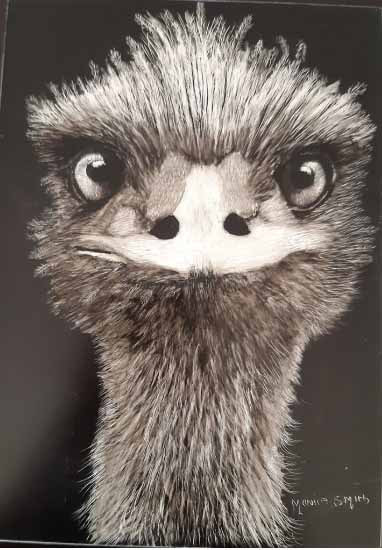 Pippin by Monica Smith
Pippin by Monica Smith By Liane Arno
I DON’T think I have laughed so much for a long time. Starved for company, Monica Smith and I meet in person rather than do the interview over the phone in order to see and talk about her works of art hanging at ArtSpace.
But what is tickling my fancy is not her art – but her wonderful joie de vivre. Unless I am very much mistaken the demographics of Bass Coast Post’s women audience would suggest that the vast majority have been through both puberty and menopause. So you can imagine my hoots of delight as Monica described her relationship with her pubescent daughter some years ago when this terrible and confusing mix of hormones was raging in equal measure in both the female members of the household.
I DON’T think I have laughed so much for a long time. Starved for company, Monica Smith and I meet in person rather than do the interview over the phone in order to see and talk about her works of art hanging at ArtSpace.
But what is tickling my fancy is not her art – but her wonderful joie de vivre. Unless I am very much mistaken the demographics of Bass Coast Post’s women audience would suggest that the vast majority have been through both puberty and menopause. So you can imagine my hoots of delight as Monica described her relationship with her pubescent daughter some years ago when this terrible and confusing mix of hormones was raging in equal measure in both the female members of the household.
The “pain in the backside” daughter (AKA Melissa) was assigned an old caravan on the newly acquired land that Monica and her husband Wes had purchased in the Yarra Valley. Monica and Wes and their son, meanwhile, lived in a shed for the three and a half years it took to build their dream house. The caravan was enclosed with a fence to keep in the dogs, cats and Sammy the goat, and was accessed by a gate between the caravan and shed. Every evening Melissa groaned in sympathy as the gate groaned on its hinges as Monica came to try and resolve whatever the day’s infraction had been.
| One day Melissa came home early from uni, sporting a newly acquired birthday present of leather jacket and an armful of books. The goat followed her eagerly. Juggling books, she finally opened the door, and threw in the key ring and books so as to better wrestle the goat out of the way. Sammy won the tussle and ended up in the caravan. The door bounced shut leaving furious Melissa outside. Monica arrived home a couple of hours later and when the caravan door was opened Sammy the goat was surrounded by half chewed boxes of cornflakes and groceries, a straw doll which had now amputated legs and worse still the much cherished Paddington Bear that Nanna had recently brought back from London for Melissa had half his hat eaten off. Needless to say, it was all Monica’s fault! Monica started life in England in a family of nine children. A £10 Pom like me, she takes me back to a time when both of our families had coal fires. As we were in the north of England, coal was easy to come by, but for those living in the south, like Monica’s family, coal was often a rarity. So much so that in order to keep warm Monica remembers the times when her mother turned on the gas stove, opened the oven door and they would sit with their feet on the door looking at the flickering gas jets and think warm thoughts. There was never much money in the household; her father’s naval pay didn’t extend too far – but her mother always managed to find enough money to buy boxes of paints for them all for Christmas. Even though they got the same thing every Christmas, they were still delighted with the paints and colouring books. They would spend the whole day creating paintings to present to their Mum who was just as thrilled to receive them. There was also loads of love – and enough to share with an incredible menagerie as well – including a monkey or two. In those days living near the docks, with a father working as a fitter in ship repairing there, having recently spent 30 years in the Royal Navy, there was always an opportunity to get something exotic returning from the colonies. |
Monica’s mum always had itchy feet and she was always applying on her husband’s behalf for jobs around the world. She didn’t have too much success due to the family having so many dependents. At one stage, in desperation, she even applied for a job in the Mexican railways – instead, it was to Australia that they headed. And that was through a convoluted means. Monica’s father met a bloke who had come over to England to meet up with other pigeon fanciers. Now he needed to get back to Australia – but had no money. He was smuggled aboard a ship bound for Melbourne and in return offered to sponsor Monica and her older sister to come to Australia. Once established, they would bring their family over.
Monica was only 19 at the time and, having been brought up in a strict household with a ten o’clock curfew, was alone with her sister on a liner, the Strathaird, with all the freedom in the world – and not a clue what to do with it. They were well cared for and arrived unscathed at the docks in Melbourne to the welcoming arms of Mrs Kearns who immediately took them to the Myer windows straight from the ship to give them a taste of Australia.
The next morning, they headed off to Colac which had proudly been described to them as having newly acquired the rating of ‘city’. Coming from the outskirts of London they were expecting something distinctly different from the beautiful country town surrounded by farmland. Monica remembers fondly that the success of the Saturday night dance was measured by how loudly the farmers could stomp their feet.
The whole family migrated when the two sisters found a house to rent in Rowville. Still very naïve, Monica found a job as a carer in Turana, a depot for wards of state, where she was well liked by the girls of 13 and 14 over whom she presided on night shift. They took great delight in sharing their exploits of how they were caught in cars with older men and taken away by the police to Turana and in the meantime shocking the young Monica.
One night a few of the girls told Monica they had considered “nicking off” because Monica had very conveniently left the door keys on the desk in the office. “Don’t worry,” they reassured her, “we won’t do it tonight because we didn’t want to see you get into trouble.”
None of Monica’s family could drive, there were no buses, so she would hitch a ride into Dandenong whenever they needed to shop. Thinking back, she is amazed she didn’t get into trouble.
She met Wes and, besides a short stint living in San Francisco, they have always called Victoria home. When their block in the Yarra Valley became too much to handle, they recognised it was time to move. Friends had moved to Wonthaggi and when Monica visited them, she was struck by the sense of peace that is here. They had always loved the sea so the decision to move was an easy one. As someone deeply involved in community in the Yarra Valley, she now finds it quite odd to have arrived in Wonthaggi at the outbreak of COVID-19 with the need to self-isolate.
What she does here is what she has always done and that is to paint. Painting animals is her first love – they have always been such an important part of her life. She used to give away her paintings until she was convinced by friends to take commissions. People love the way she is able to capture not just the image but the spirit of their pets.
Of recent years she has not only found scratchboard as a new medium but also that she can paint portraits. She has three entries in the now postponed Archies Bald. Once again, she wanted to give the portraits to the sitters – but as it is such a good cause these lovely people have donated to the Cancer Council instead. What a perfect solution!
You can arrange an appointment to see Monica’s work at ArtSpace by appointment through [email protected] – or check out noahsarkpaintings.com.au if you would like a commission.
Monica was only 19 at the time and, having been brought up in a strict household with a ten o’clock curfew, was alone with her sister on a liner, the Strathaird, with all the freedom in the world – and not a clue what to do with it. They were well cared for and arrived unscathed at the docks in Melbourne to the welcoming arms of Mrs Kearns who immediately took them to the Myer windows straight from the ship to give them a taste of Australia.
The next morning, they headed off to Colac which had proudly been described to them as having newly acquired the rating of ‘city’. Coming from the outskirts of London they were expecting something distinctly different from the beautiful country town surrounded by farmland. Monica remembers fondly that the success of the Saturday night dance was measured by how loudly the farmers could stomp their feet.
The whole family migrated when the two sisters found a house to rent in Rowville. Still very naïve, Monica found a job as a carer in Turana, a depot for wards of state, where she was well liked by the girls of 13 and 14 over whom she presided on night shift. They took great delight in sharing their exploits of how they were caught in cars with older men and taken away by the police to Turana and in the meantime shocking the young Monica.
One night a few of the girls told Monica they had considered “nicking off” because Monica had very conveniently left the door keys on the desk in the office. “Don’t worry,” they reassured her, “we won’t do it tonight because we didn’t want to see you get into trouble.”
None of Monica’s family could drive, there were no buses, so she would hitch a ride into Dandenong whenever they needed to shop. Thinking back, she is amazed she didn’t get into trouble.
She met Wes and, besides a short stint living in San Francisco, they have always called Victoria home. When their block in the Yarra Valley became too much to handle, they recognised it was time to move. Friends had moved to Wonthaggi and when Monica visited them, she was struck by the sense of peace that is here. They had always loved the sea so the decision to move was an easy one. As someone deeply involved in community in the Yarra Valley, she now finds it quite odd to have arrived in Wonthaggi at the outbreak of COVID-19 with the need to self-isolate.
What she does here is what she has always done and that is to paint. Painting animals is her first love – they have always been such an important part of her life. She used to give away her paintings until she was convinced by friends to take commissions. People love the way she is able to capture not just the image but the spirit of their pets.
Of recent years she has not only found scratchboard as a new medium but also that she can paint portraits. She has three entries in the now postponed Archies Bald. Once again, she wanted to give the portraits to the sitters – but as it is such a good cause these lovely people have donated to the Cancer Council instead. What a perfect solution!
You can arrange an appointment to see Monica’s work at ArtSpace by appointment through [email protected] – or check out noahsarkpaintings.com.au if you would like a commission.


